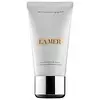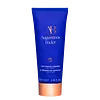What's inside
What's inside
 Key Ingredients
Key Ingredients

 Benefits
Benefits

 Concerns
Concerns

 Ingredients Side-by-side
Ingredients Side-by-side

Myristic Acid
CleansingGlycerin
HumectantBehenic Acid
CleansingPalmitic Acid
EmollientSodium Methyl Cocoyl Taurate
CleansingPotassium Hydroxide
BufferingLauric Acid
CleansingStearic Acid
CleansingAlgae Extract
EmollientSesamum Indicum Seed Oil
EmollientMedicago Sativa Seed Powder
Skin ConditioningHelianthus Annuus Seedcake
AbrasivePrunus Amygdalus Dulcis Seed Meal
AbrasiveEucalyptus Globulus Leaf Oil
PerfumingSodium Gluconate
Skin ConditioningCopper Gluconate
Skin ConditioningCalcium Gluconate
HumectantMagnesium Gluconate
Skin ConditioningZinc Gluconate
Skin ConditioningTocopheryl Succinate
AntioxidantNiacin
SmoothingSesamum Indicum Seed Powder
Skin ConditioningQuartz Powder
AbrasiveNephrite Powder
AbrasivePearl Powder
Caffeine
Skin ConditioningMaris Sal
Skin ConditioningHumic Acids
Skin ConditioningSodium Hyaluronate
HumectantSucrose
HumectantTourmaline
Macrocystis Pyrifera Protein
Skin ConditioningPolyquaternium-51
Skin ConditioningAloe Barbadensis Leaf Water
MaskingTrehalose
HumectantCellulose
AbsorbentButylene Glycol
HumectantSodium Coco Pg-Dimonium Chloride Phosphate
CleansingSodium Bicarbonate
AbrasiveSodium PCA
HumectantPEG-3 Distearate
EmulsifyingUrea
BufferingParfum
MaskingDisodium EDTA
Linalool
PerfumingLimonene
PerfumingPhenoxyethanol
PreservativeMethylchloroisothiazolinone
PreservativeMethylisothiazolinone
PreservativeCI 19140
Cosmetic ColorantCI 15985
Cosmetic ColorantCI 42090
Cosmetic ColorantCI 61570
Cosmetic ColorantMyristic Acid, Glycerin, Behenic Acid, Palmitic Acid, Sodium Methyl Cocoyl Taurate, Potassium Hydroxide, Lauric Acid, Stearic Acid, Algae Extract, Sesamum Indicum Seed Oil, Medicago Sativa Seed Powder, Helianthus Annuus Seedcake, Prunus Amygdalus Dulcis Seed Meal, Eucalyptus Globulus Leaf Oil, Sodium Gluconate, Copper Gluconate, Calcium Gluconate, Magnesium Gluconate, Zinc Gluconate, Tocopheryl Succinate, Niacin, Sesamum Indicum Seed Powder, Quartz Powder, Nephrite Powder, Pearl Powder, Caffeine, Maris Sal, Humic Acids, Sodium Hyaluronate, Sucrose, Tourmaline, Macrocystis Pyrifera Protein, Polyquaternium-51, Aloe Barbadensis Leaf Water, Trehalose, Cellulose, Butylene Glycol, Sodium Coco Pg-Dimonium Chloride Phosphate, Sodium Bicarbonate, Sodium PCA, PEG-3 Distearate, Urea, Parfum, Disodium EDTA, Linalool, Limonene, Phenoxyethanol, Methylchloroisothiazolinone, Methylisothiazolinone, CI 19140, CI 15985, CI 42090, CI 61570
Water
Skin ConditioningGlycerin
HumectantSodium Cocoyl Isethionate
CleansingBehenyl Alcohol
EmollientSodium Cocoyl Glycinate
CleansingGlycol Distearate
EmollientSodium Lauryl Sulfoacetate
CleansingArachidyl Alcohol
EmollientCetearyl Alcohol
EmollientLeuconostoc/Radish Root Ferment Filtrate
AntimicrobialCitric Acid
BufferingArachidyl Glucoside
EmulsifyingHydroxyacetophenone
AntioxidantLactobacillus
Skin ConditioningNiacinamide
SmoothingXanthan Gum
EmulsifyingSodium Citrate
BufferingCocos Nucifera Fruit Extract
EmollientGalactoarabinan
Quillaja Saponaria Wood Extract
Skin ConditioningPropanediol
SolventLansium Domesticum Leaf Extract
Skin ConditioningMaltodextrin
AbsorbentCaprylic/Capric Triglyceride
MaskingHydrolyzed Rice Protein
Skin ConditioningTocopheryl Acetate
AntioxidantMoringa Oleifera Seed Oil
EmollientAlanyl Glutamine
HumectantArginine
MaskingCeramide NP
Skin ConditioningCeramide AP
Skin ConditioningGlycine
BufferingLysine
Skin ConditioningPentylene Glycol
Skin ConditioningPhytosterols
Skin ConditioningProline
Skin ConditioningSodium Cetearyl Sulfate
CleansingOrobanche Rapum Extract
Skin ProtectingSodium Hydroxide
BufferingAscorbic Acid
AntioxidantBehenic Acid
CleansingBrassica Alba Seed Extract
Skin ConditioningHydrogenated Lecithin
EmulsifyingLeontopodium Alpinum Flower/Leaf Extract
Skin ConditioningOleic Acid
EmollientOligopeptide-177
Oligopeptide-6
Skin ConditioningPalmitic Acid
EmollientPhenylalanine
MaskingPotassium Sorbate
PreservativeSodium Chloride
MaskingStearic Acid
CleansingSunflower Seed Acid
CleansingWater, Glycerin, Sodium Cocoyl Isethionate, Behenyl Alcohol, Sodium Cocoyl Glycinate, Glycol Distearate, Sodium Lauryl Sulfoacetate, Arachidyl Alcohol, Cetearyl Alcohol, Leuconostoc/Radish Root Ferment Filtrate, Citric Acid, Arachidyl Glucoside, Hydroxyacetophenone, Lactobacillus, Niacinamide, Xanthan Gum, Sodium Citrate, Cocos Nucifera Fruit Extract, Galactoarabinan, Quillaja Saponaria Wood Extract, Propanediol, Lansium Domesticum Leaf Extract, Maltodextrin, Caprylic/Capric Triglyceride, Hydrolyzed Rice Protein, Tocopheryl Acetate, Moringa Oleifera Seed Oil, Alanyl Glutamine, Arginine, Ceramide NP, Ceramide AP, Glycine, Lysine, Pentylene Glycol, Phytosterols, Proline, Sodium Cetearyl Sulfate, Orobanche Rapum Extract, Sodium Hydroxide, Ascorbic Acid, Behenic Acid, Brassica Alba Seed Extract, Hydrogenated Lecithin, Leontopodium Alpinum Flower/Leaf Extract, Oleic Acid, Oligopeptide-177, Oligopeptide-6, Palmitic Acid, Phenylalanine, Potassium Sorbate, Sodium Chloride, Stearic Acid, Sunflower Seed Acid
 Reviews
Reviews

Ingredients Explained
These ingredients are found in both products.
Ingredients higher up in an ingredient list are typically present in a larger amount.
Behenic Acid is a fatty acid and has moisturizing properties.
It is naturally occuring in the Moringa oleifera tree, rapeseed oil, and peanut oil.
This ingredient may not be Malassezia folliculitis, or fungal acne safe.
Learn more about Behenic AcidGlycerin is already naturally found in your skin. It helps moisturize and protect your skin.
A study from 2016 found glycerin to be more effective as a humectant than AHAs and hyaluronic acid.
As a humectant, it helps the skin stay hydrated by pulling moisture to your skin. The low molecular weight of glycerin allows it to pull moisture into the deeper layers of your skin.
Hydrated skin improves your skin barrier; Your skin barrier helps protect against irritants and bacteria.
Glycerin has also been found to have antimicrobial and antiviral properties. Due to these properties, glycerin is often used in wound and burn treatments.
In cosmetics, glycerin is usually derived from plants such as soybean or palm. However, it can also be sourced from animals, such as tallow or animal fat.
This ingredient is organic, colorless, odorless, and non-toxic.
Glycerin is the name for this ingredient in American English. British English uses Glycerol/Glycerine.
Learn more about GlycerinPalmitic Acid is a fatty acid naturally found in our skin and in many plant and animal sources. In cosmetics, it is usually derived from palm oil. It serves many purposes in skincare, acting as a cleanser, emollient, and emulsifier.
As an emollient, palmitic acid helps soften and smooth the skin by preventing water loss. In cleansers, it helps remove oil and dirt while creating foam.
Its emulsifying properties help stabilize products by keeping water and oil-based ingredients from separating.
This may not be suitable for fungal acne-prone skin, as fatty acids like this can sometimes trigger breakouts in sensitive individuals.
Learn more about Palmitic AcidStearic Acid is a fatty acid. It is an emollient, emulsifier, and texture enhancer.
As an emollient, stearic acid helps soften skin. It aids the skin's protective barrier by preventing water loss. It also provides a gentle cleansing effect without stripping away natural oils.
Stearic acid may also be used to enhance the texture of products. It can add volume and stabilize ingredients such as water and oil. This can help water and oil ingredients from separating.
Sources of stearic acid include animal or vegetable fats/oils such as coconut or shea. It can be naturally found in butter, cocoa butter, shea butter, vegetable fats, and animal tallow.
This ingredient may not be Malassezia folliculitis, or fungal-acne safe.
Learn more about Stearic Acid